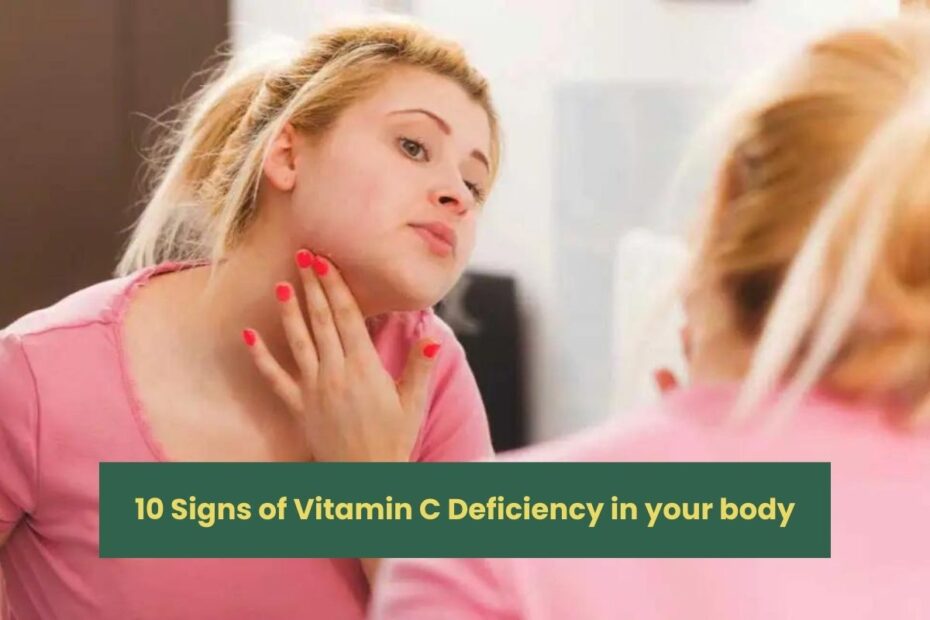Vitamin C, which is also called ascorbic acid, is an important nutrient that helps the body do many things, like protecting the immune system, making collagen, and protecting cells from damage. Vitamin C is important for healthy skin, connective tissues, and general health, so not getting enough of it can cause a number of health problems.
10 Signs of Vitamin C Deficiency in your body
1. Fatigue and Weakness
One of the first signs of not getting enough vitamin C is feeling tired and weak all the time. Carnitine is a substance that helps move fatty acids into cells for energy. Vitamin C is needed to make energy and carnitine.
If you don’t get enough vitamin C, your body might have trouble making enough energy, which can make you feel tired. According to a study in The American Journal of Clinical Nutrition, not getting enough vitamin C can make it harder to do physical activities and keep going.
2. Frequent Infections and Poor Wound Healing
Vitamin C is very important for keeping the defense system strong. It helps make white blood cells and keeps them working properly, which are very important for fighting illnesses. Not getting enough vitamin C can make your defense system weaker, which makes you more likely to get infections.
In addition, vitamin C is needed to make collagen, which is needed for wounds to heal. Studies published in The Journal of Clinical Nutrition have shown that not getting enough vitamin C can make it harder for wounds to heal and raise the risk of getting infections.
3. Bleeding Gums
If you don’t get enough vitamin C, your gums will bleed. Vitamin C is very important for the health of gums and other connective organs. Gingivitis is a condition where your gums swell, bleed, and hurt because of a lack of something.
If this problem is not handled, it can get worse and turn into gum disease. Clinical observations and study published in the Journal of Periodontology stress how important vitamin C is for keeping gums healthy and avoiding gum disease.
4. Dry, Rough Skin
Because it helps make collagen, vitamin C is very important for keeping skin healthy. Collagen is a tough protein that helps skin stay hard and stretchy. Lack of vitamin C can make your skin dry, rough, and slippery, and it can also cause keratosis pilaris, which are small, red bumps that show up on your shoulders. Dermatologic Therapy released research that shows how important vitamin C is for keeping skin healthy and flexible.
Also see:-10 Vegetarian Foods Rich In Iron
5. Easy Bruising
If you don’t get enough vitamin C, you might bruise easily. If you don’t get enough vitamin C, your skin and blood vessels become more weak, which makes you more likely to get bruises.
This happens because vitamin C is needed to make collagen, which makes blood vessels and connective parts stronger. A study in The Journal of Nutritional Biochemistry says that not getting enough vitamin C can make you more likely to bruise and bleed.
6. Joint Pain and Swelling
For connecting tissues, like those in the joints, to stay healthy, you need vitamin C. Because it stops the body from making collagen, a shortage can cause joint pain and swelling. This sickness is called scurvy, and it can weaken cartilage and cause swelling. A study in The British Medical Journal talks about the link between not getting enough vitamin C and joint pain, highlighting the importance of this nutrient in keeping joints healthy.
7. Anemia
Anemia, a disease marked by low red blood cell counts, can be made worse by not getting enough vitamin C. It is important for making red blood cells, and vitamin C makes it easier for the body to absorb non-heme iron, which is found in plant-based foods.
Anemia can happen when your body can’t absorb iron because you don’t have enough vitamin C. Studies in The Journal of Nutrition show how vitamin C affects iron intake and how not getting enough vitamin C can make anemia worse.
8. Mood Changes and Depression
Serotonin and other hormones are made with vitamin C. Serotonin helps keep your mood in check. If you don’t get enough vitamin C, it can affect your mental health and cause problems like anger, mood swings, and even sadness. Psychiatry research has found a link between low vitamin C levels and a higher chance of mood disorders. This shows how important the nutrient is for mental health.
9. Swollen and Bleeding Gums
Gums that are swollen and bleeding are often signs of severe vitamin C shortage. This condition, which is often linked to scurvy, happens because gum tissue needs vitamin C to stay healthy. If you don’t get enough vitamin C, your gums can swell up and bleed easily, which can lead to other problems with your mouth health. The link between not getting enough vitamin C and gum health is emphasized in clinical studies released in The Journal of Clinical Periodontology.
10. Hair and Nail Changes
Hair and nails can change if you don’t get enough vitamin C. Your hair might get dry, brittle, and more likely to break, and your nails might get weak and more likely to break. Changes like these happen because vitamin C is needed to make collagen, which gives hair and nails their shape and power. A study in The American Journal of Clinical Nutrition shows how important vitamin C is for keeping hair and nails healthy.
